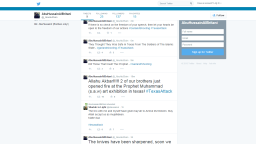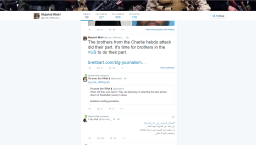ISIS jihadi linked to Garland attack has long history as hacker | CNN (original) (raw)
Story highlights
Sources: Junaid Hussain, aka Abu Hussain al-Britani, led hacking group before joining ISIS
Series of tweets links Garland, Texas, gunmen to Hussain and another suspected terrorist
Fellow hacker: "Insane and hilarious" Hussain isn't "someone that should be taken lightly"
CNN —
Before becoming a law enforcement focus in the attack on a Garland, Texas, cartoon contest, Junaid Hussain went by the cyber pseudonym “TriCk.”
Tweets between Hussain and one of the gunmen have lent credence to ISIS’ claim that it was responsible for the attack, though outside of Hussain’s involvement with the terror outfit, it’s difficult to say exactly what role ISIS played. What’s known of Hussain is pieced together from court records, police documents, online and social media activity, terrorism experts and a fellow hacker.
From these sources, the portrait emerges of a dangerous hacker and influential recruiter who’s able to crack online banking security systems and who has demonstrated on occasion a zany sense of humor, once dressing up as a Power Ranger and wielding a machine gun during an online chat.
The 20-year-old hacker now goes by the moniker Abu Hussain al-Britani, he told CNN last year, a claim confirmed by American organizations tracking jihadi websites. A former member of a hacker collective that Hussain once led also told CNN that al-Britani and Hussain are the same person.
The Briton is believed to have traveled to Syria in 2013 as police in Birmingham, England, investigated him in relation to a violent disorder allegation, a British security expert said. At least a half-dozen British media outlets reported Hussain skipped bail.
It is believed that he was recruited by ISIS prior to leaving for Syria. He is now married to ISIS convert Umm Hussain al-Britani (formerly Sally Jones), who is 25 years his senior, the security expert told CNN.
Terror analysts say he is one of the most accomplished hackers fighting for ISIS.
Hussain grew up in the King’s Heath neighborhood of Birmingham, the oldest son of a cafeteria worker, the expert said. He was shy and reclusive as a kid, the expert said.
For a hacker, Hussain has a fairly high profile. A collective of which he was formerly a member, TeaMp0isoN, has been suspected in cyberattacks involving former Alaska Gov. Sarah Palin, NASA, NATO, the United Nations, BlackBerry, the English Defence League, American and Israeli banks and Facebook, among others.
London’s Metropolitan Police said Hussain, who it identified as TeaMp0isoN’s then-teen leader, pleaded guilty to a public nuisance conspiracy charge and a violation of the Computer Misuse Act in June 2012.
How to protect yourself from hacks
The first charge was related to a series of “nuisance phone calls” targeting Britain’s anti-terrorism hotline, “preventing legitimate callers getting through,” the Met statement said, while the second charge involved illegally acquiring and publishing former Prime Minister Tony Blair’s address book.
“Hussain’s actions were foolish and irresponsible,” Stewart Garrick, a detective inspector who investigates the most serious cybercrimes, said in a statement.
He was sentenced to six months in a young offender institution, London’s Southwark Crown Court said in a statement.
There have been allegations Hussain founded the pro-ISIS hacking group Cyber Caliphate, which made headlines with its January takeover of the U.S. Central Command’s Twitter account. He is also alleged to have been one of those circulating a so-called hit list containing addresses of U.S. military personnel in March.
Hussain, in an online communication with CNN at the time of the incident, denied involvement.
The hacker is linked to Monday’s attack on the Garland, Texas, contest, in which participants were asked to draw comics featuring Islam’s Prophet Mohammed, via a series of tweets before and after a policeman killed gunmen Elton Simpson and Nadir Soofi.
Hussain may have played a role in inspiring the gunmen, a U.S. official told CNN.
First, Simpson urged people on Twitter to follow al-Britani. Then, al-Britani retweeted an apparent announcement from Simpson that he and Noofi had pledged allegiance to ISIS leader Abu Bakr al-Baghdadi. After news of the attack broke, al-Britani tweeted, “Allahu Akbar!!!!! 2 of our brothers just opened fire at the Prophet Muhammad (s.a.w) art exhibition in texas! #TexasAttack.”

“Allahu Akbar” means “God is the greatest,” while “s.a.w.” is short for “Peace Be Upon Him.” It’s common for Muslims to write “s.a.w.” or “PBUH” after using Mohammed’s name.
It is possible al-Britani had knowledge an attack was in the works. Several hours before the Garland attack he tweeted, “soon we will come to your streets with death and slaughter!”
The account used by al-Britani has now been suspended, but a person using the same moniker, similar handle and a well-circulated photo of al-Britiani opened a Twitter account on the day of the attack – the same day his old account was suspended – and tweeted, “I’m back again.” Included in that tweet were the English transliterations for the Arabic phrases “God willing” and “May God reward you.”
The following day, someone tweeted from that account a photo purportedly from the Texas attack and in a separate tweet said, “you ain’t seen nothing yet #QaribanQariba.” The hashtag means, “Soon soon.”
A look at ISIS’ American recruits
Before the al-Britani account was suspended following the Texas attack, a tweet appeared Saturday giving the address of a U.S. Army major general charged with counterterrorism operations.
The address was retweeted by an account thought to belong to Mohammed Abdulhali Hassan, a Minnesotan who court documents indicate traveled to Somalia in 2008 to join al-Shabaab and who also is suspected of involvement in the Texas attack.

A week before the Garland event, Simpson mentioned the contest in a tweet to the account that’s believed to be Hassan’s and asked, “When will they ever learn?”
Came the response: “The brothers from the Charlie Hebdo attack did their part. It’s time for brothers in the #US to do their part.” It was a reference to a similar attack in Paris in which two self-proclaimed Islamist terrorists went on a deadly shooting rampage at the offices of the satirical newspaper, which was known to lampoon Islam’s prophet as well as other religious figures.
Simpson retweeted the threat, according to SITE Intelligence Group, a Bethesda, Maryland, company that monitors the online activity of white supremacists and jihadis.
If the al-Britani account belongs to Hussain, it would not be the first time his account has been suspended or he’s changed handles. Radical Islamists frequently change handles to circumvent suspensions.
According to a U.S. official, American investigators are looking at the degree to which Hussain inspired or had a hand in Monday’s attack in Garland. He’s seen as a special threat because he’s technically savvy, understands Western media and apparently has demonstrated leadership skills, the official said.
Another official dubbed Hussain “a real problem” because of his ability to recruit online and inspire others, and a third U.S. official told CNN that Hussain is a key figure in ISIS.
“He’s a tech-savvy public face,” the official said. “The belief is that he’s likely in Syria, but as you know it’s tough to know that for certain. One of the theories investigators are exploring is whether Simpson was just trying to gain Hussain’s approval and get on his radar or whether there was actually back-and-forth communication between the two men.”
CNN has reached out to Hussain, via the al-Britani Twitter account, but has received no response.
Was the Garland shooting inevitable?
A former TeaMp0isoN member identifying himself only as MLT declined to give his real name or location, but told CNN that al-Britani is Hussain. MLT spoke to CNN because he felt Hussain is a serious threat and may be recruiting other hackers to launch cyberattacks for ISIS. Targets may include banks and online payment services, he said.
“As early as a few years ago, I knew that Trick was capable of stealing from bank accounts and PayPal accounts and siphoning money out – using those funds for malicious activities. And I’m not talking about hundreds of dollars; I’m talking hundreds of thousands, maybe millions of dollars. So, yeah, I think that guy is a serious threat. He is extremely dangerous and he is not someone that should be taken lightly,” he said.
But MLT didn’t always feel that way, especially when he was first acquainted with Hussain.
“He struck me as of above-average intelligence, extremely capable with his hacking skill,” the hacker told CNN. “That’s one of the reasons we recruited him to Team Poison – a capable hacker, but to me, he seemed insane and hilarious, and I think that’s why we got along. He was a funny guy.”
Because of that jovial demeanor, MLT initially didn’t think much of it when Hussain once appeared on a Skype video chat in a black Power Rangers outfit holding what appeared to be an airsoft rifle, he said.
He said he quickly realized the weapon “was a fully automatic machine gun when he took out the magazine and showed me the ammunition and put the bullets on his desk.”
CNN’s Atika Shubert, Paul Cruickshank, Bharati Naik and Paul Murphy contributed to this report.